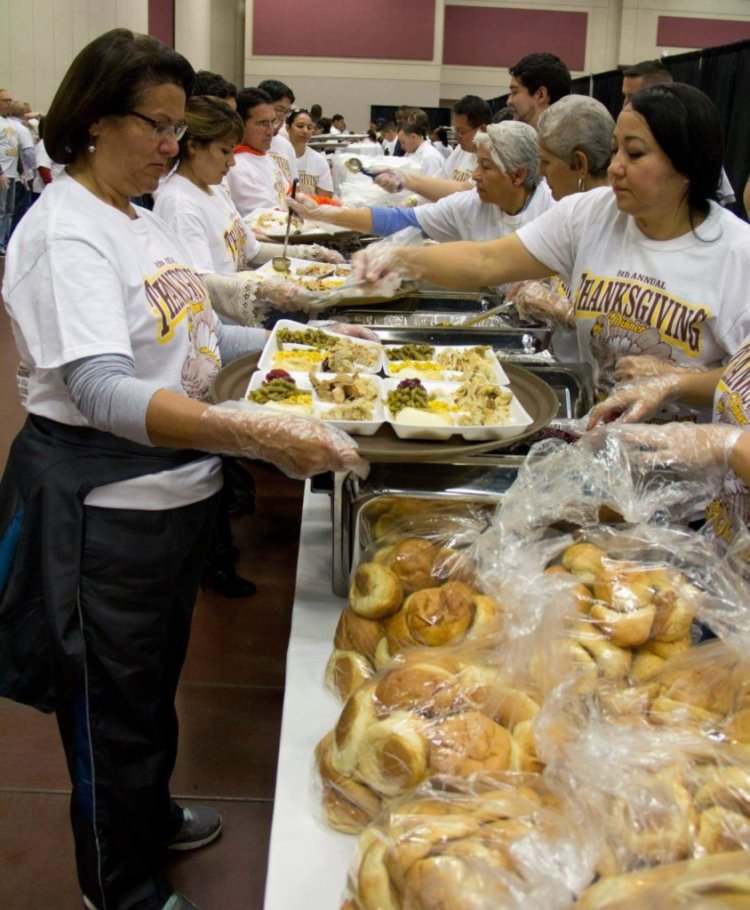
This past Thanksgiving, I had the opportunity to experience two feasts; one with the disadvantaged and one with the privileged. In the morning, I volunteered for a shift serving food at an annual community dinner. After my shift, I spent the rest of the holiday at a well-to-do family member’s estate.
At the community dinner, I was in awe of the amazing display of fellowship — from countless restaurants, grocery stores and businesses that donated pounds of food and supplies. Thousands of volunteers congregated, ready and eager to participate. Not only was there a wonderful sit-down Thanksgiving meal, there were also tables of groceries, hygiene kits, blankets and clothes for the taking. Although the event was opened to the public, the majority of the guests were low-income families, seniors, veterans and the homeless.
Inside the luxurious residence, 25 of my relatives dined on a lavish Thanksgiving banquet, but not before expressing sentiments of gratitude. After we had eaten, we distributed the remaining food to local soup kitchens and homeless shelters.
The lives of the wealthy and the poor, to the untrained eye, appears to be vastly different. The media does little to suggest otherwise. Generally, the rich are portrayed as an independent group often suspected as being more selfish than others and not giving enough to society; the poor are depicted as criminal and anti-social and, often, eschewing moral principles. Wealth and poverty narratives are seldom presented with commonalities. Yet, there are more similarities between the well-to-do and those who are impoverished than we may realize.
Based on my observations, here’s my personal perspective:
- We are all social beings, so relationships are important to everyone, regardless of status.
- Many people are compassionate, and that compassion motivates altruistic actions, despite socio-economic class.
- People have a social contract; to be able to live in a civil society. We invite people into our lives, sit around a table and share food with one another.
- When we sit around a table and eat together, we usher in new ways of relating to one another by sharing our life stories in tangible and transformative ways. Our stories illustrate our inherent connectedness with each other.
At the community dinner, the affluent and the underprivileged were neither morally better nor worse than the other. Everyone was right-sized for the day. At my family celebration, we each used our voices as we took turns giving thanks. Although we don’t always see eye to eye, for those few hours together, there was unity.
There is no denying that the socioeconomic disparity between the rich and the poor is stark and serious, and cannot be bridged only on Thanksgiving. But what I’m grateful for this Thanksgiving is the opportunity to be part of a space where the community takes care of those who are less fortunate and the chance to connect with family who are mindful and grateful for what they have and who pay it forward.
So, after eating the turkey and pumpkin pie, and after Black Friday and Cyber Monday door-buster deals have been bought, #GivingTuesday, which is today, is when people will be turning their spending into donating. It’s a day when the world comes together to give and kicks off the charitable season, when many focus on their holiday and end-of-year giving. Please consider joining the movement and give – whether it’s some of your time, a donation, skills and talents or the power of your voice. Let this day of philanthropy inspire more days of giving back. And let it begin with me.
Jillian Kano is a survivor of chronic, complex trauma and abuse. Her healing journey began after discovering her high score on the ACE (Adverse Childhood Experiences) scale, a test that assesses different types of childhood abuse and neglect. Since then, she has been on a path of recovery and advocates for those who have yet to find their voice. Yoga practice has brought her long-term relief and self- transformation.


Grok Nation Comment Policy
We welcome thoughtful, grokky comments—keep your negativity and spam to yourself. Please read our Comment Policy before commenting.